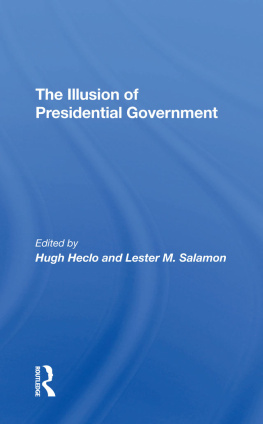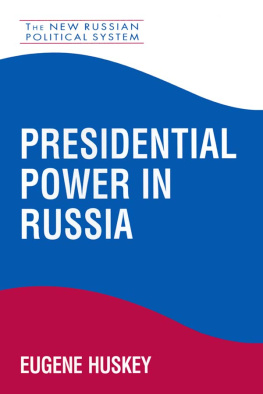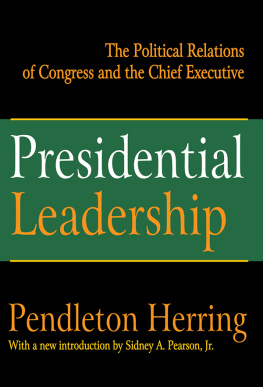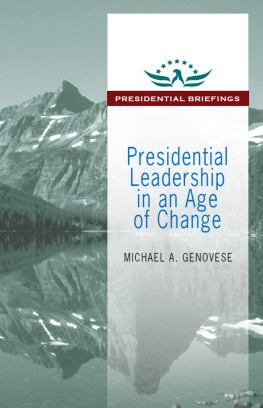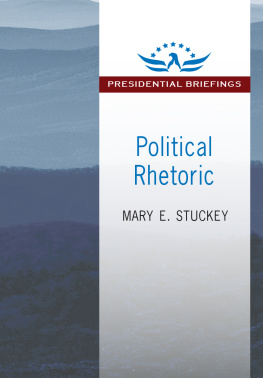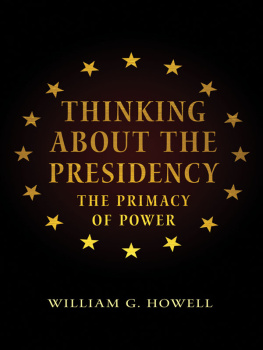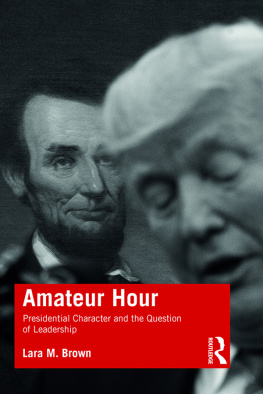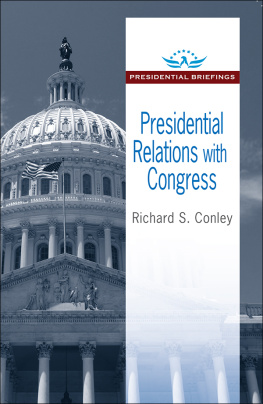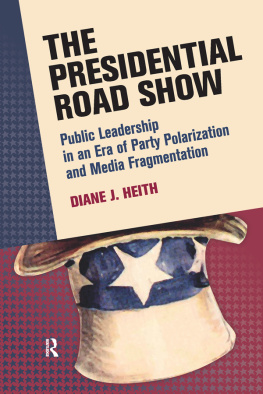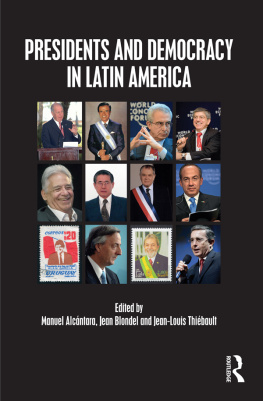The Illusion of Presidential Government
Also of Interest
A Danger of Democracy: The Presidential Nominating Process, Terry Sanford
National Interests and Presidential Leadership: The Setting of Priorities, Donald E. Nuechterlein
Presidents, Secretaries of State, and Crises in U.S. Foreign Relations: A Model and Predictive Analysis, Lawrence Falkowski
Presidential Decisionmaking in Foreign Policy: The Effective Use of Information and Advice, Alexander L. George
The President, the Budget, and Congress: Impoundment and the 1974 Budget Act, James P. Pfiffner
Available in hardcover and paperback.
The Illusion of Presidential Government
edited by Hugh Heclo and Lester M . Salamon
First published 1981 by Westview Press, Inc.
Published 2019 by Routledge
52 Vanderbilt Avenue, New York, NY 10017
2 Park Square, Milton Park, Abingdon, Oxon OX14 4RN
Routledge is an imprint of the Taylor & Francis Group, an informa business
Copyright 1981 by the National Academy of Public Administration
All rights reserved. No part of this book may be reprinted or reproduced or utilised in any form or by any electronic, mechanical, or other means, now known or hereafter invented, including photocopying and recording, or in any information storage or retrieval system, without permission in writing from the publishers.
Notice:
Product or corporate names may be trademarks or registered trademarks, and are used only for identification and explanation without intent to infringe.
Library of Congress Cataloging in Publication Data
Main entry under title:
The illusion of presidential government.
"Most of the chapters in this volume were originally prepared during the spring and summer of 1980 for use by a panel on presidential management convened by the National Academy of Public Administration"-Pref.
Includes index.
1. Presidents-United States-Addresses, essays, lectures. I. Heclo, Hugh. II. Salamon, Lester M. III. National Academy of Public Administration.
JK516.143 353.03'1 81-10343
AACR2
ISBN 13: 978-0-367-29297-3 (hbk)
Contents
, Hugh Heclo
Part One
The Unwritten Constitution
, Louis Fisher
, John Helmer
Part Two
Process Management
, Allen Schick
, G. Calvin Mackenzie
Lester M. Salamon
Part Three
Policy Management
, Lester M. Salamon
, Roger B. Porter
, Anna Kasten Nelson
, I. M. Destler
, Lester M. Salamon
Appendix
A Presidency for the 1980s: A Report by a Panel of the National Academy of Public Administration
Nothing about the presidency is as simple as it seems. How could it be? The office is more than a man but less than a fixed institution. It is a place where a never-ending stream of transient personalities are expected to perform vital, permanent functions for the rest of government, where an uncommon person is expected to act on the concerns of common people, to lead without being power-hungry, to manage without seeming manipulative, to speak for a nation that never expresses itself with one voice. The presidency is an altar erected by democratic opinion, sometimes for worship, sometimes for human sacrifice.
Amid this complex turmoil, the work of government goes on. Whatever one's likes or dislikes about a particular president, our system of government needs an effective presidency. But what does "effective presidency" mean? Can we really be expected to separate our understanding and appraisal of the office from our feelings about the "him" (and probably someday "her") who happens to be there? This book argues that we can. Each chapter addresses the problem of presidential effectiveness by looking at the major operations of the modern presidencyfrom struggles with Congress for control of administrative detail to problems of managing the economy and national security.
Work on this book began in the fall of 1979, before the Iranian hostage crisis and at a time of severe and widespread loss of confidence in the Carter presidency. It ended a month after the attempted assassination of Ronald Reagan amid an ebullient presidential honeymoon. No one is likely to discount the importance of such events. What is likely to be misperceived are the longer-term, underlying processes of government that constrain and shape the meaning of such dramatic events when it comes down to the day-to-day reality of governing. It is to this broader view that the chapters in this book are directed. If the authors and editors have succeeded, the analyses should have greater staying power than the presidential headaches and honeymoons of the last few years.
Most of the chapters in this volume were originally prepared during the spring and summer of 1980 for use by a panel on presidential management convened by the National Academy of Public Administration. They were then updated in March of 1981. For ourselves and on behalf of the other authors we would like to thank the members of the National Academy for their support in this work. Our special thanks go to George Esser, the president of the Academy, and his assistant, Jeff Jacobs, who made the entire project possible. Time and other pressures were never allowed to interfere with the Academy's initial directive that we should present and publish our own views, based on the most objective information available. We have tried to follow those standards throughout this volume.
At the end of this book we have included the final report of the National Academy of Public Administration's Panel on Presidential Management. As the views expressed in the body of the book are those of the individual contributors, so the report represents the views of the panel responsible for its preparation. Given the complexity of the subject, it is not surprising that different people at times come to different conclusions. But in a larger sense, the same viewpoint has animated the entire enterprise: to see the managerial role of the president steadily and as a whole, without illusions.
Hugh Heclo
Lester M. Salamon
Washington, D.C.
I. M. Destler is a senior associate at the Carnegie Endowment for International Peace, where he directs the research project on executive congressional relations. He is the author of Presidents, Bureaucrats, and Foreign Policy (1972) and Making Foreign Economic Policy (1980). He earned his Ph.D. at the Woodrow Wilson School, Princeton University.
Louis Fisher joined the Congressional Research Service of the Library of Congress in 1970, after having taught for three years at Queens College. He holds a doctorate in political science from the New School for Social Research. His publications include President and Congress (1972), Presidential Spending Power (1975), The Constitution Between Friends (1978), and The Politics of Shared Power (1981).
Hugh Heclo is professor of government at Harvard University. A former senior fellow at the Brookings Institution, he earned his Ph.D. at Yale and is author of A Government of Strangers: Executive Politics in Washington (1977).
John Helmer was the former chief of the Urban and Community Impact Analysis unit of the Office of Management and Budget. He has served on President Carter's Reorganization Project and as an adviser to the World Bank and the United Nations, as well as to governments in Australia, Pakistan, and Sri Lanka. He received his Ph.D. from Harvard and is the author of several books, including The Politics of Advice (forthcoming).

